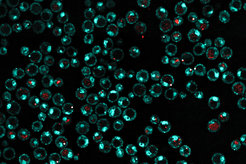Autophagy complex varies in response to nutrient deprivation in the cell environment
Starting point for the development of new drugs against fungal infections
A lack of nutrients triggers a recycling process in cells known as autophagy. Autophagy plays an important role in ageing and is directly linked to many human diseases. How cells regulate autophagy appropriately under different conditions is therefore a central question in cell biology. The molecular starting point of autophagy is an initiation complex consisting of several proteins. Researchers at the Max Planck Institute for Biology of Ageing in Cologne, Germany, have now uncovered new mechanisms of how this complex is formed so that autophagy can be adapted depending on which substances are missing in the environment.

The research team studied how baker's yeast (Saccharomyces cerevisiae) responds to a lack of phosphate in its environment. They discovered that the phosphate sensor Pho81 binds directly to the initiation complex to adapt the activity of the complex specifically to the phosphate deficiency. Interestingly, Pho81 also renders central components of the complex (Atg13 and Atg17) partially dispensable.
"Until now, Atg13 and Atg17 were thought to be essential for autophagy. However, our results show that the initiation complex is composed differently depending on which deficiency is present in the cellular environment," explains Angelina Groß, first author of the study. The researchers hypothesise that cells specifically degrade certain components in this way in order to adapt to the different conditions in their environment.
Pho81 as a potential key to the development of new antifungal drugs
The researchers' findings are also a possible starting point for the development of drugs against fungal infections, in which the phosphate sensor Pho81 plays an important role. If the function of Pho81 is disrupted, yeast fungi can no longer cause lung infection or meningitis. "It will be exciting to see if and how our basic research can be translated into new therapeutic strategies," says Martin Graef, who led the research project.



